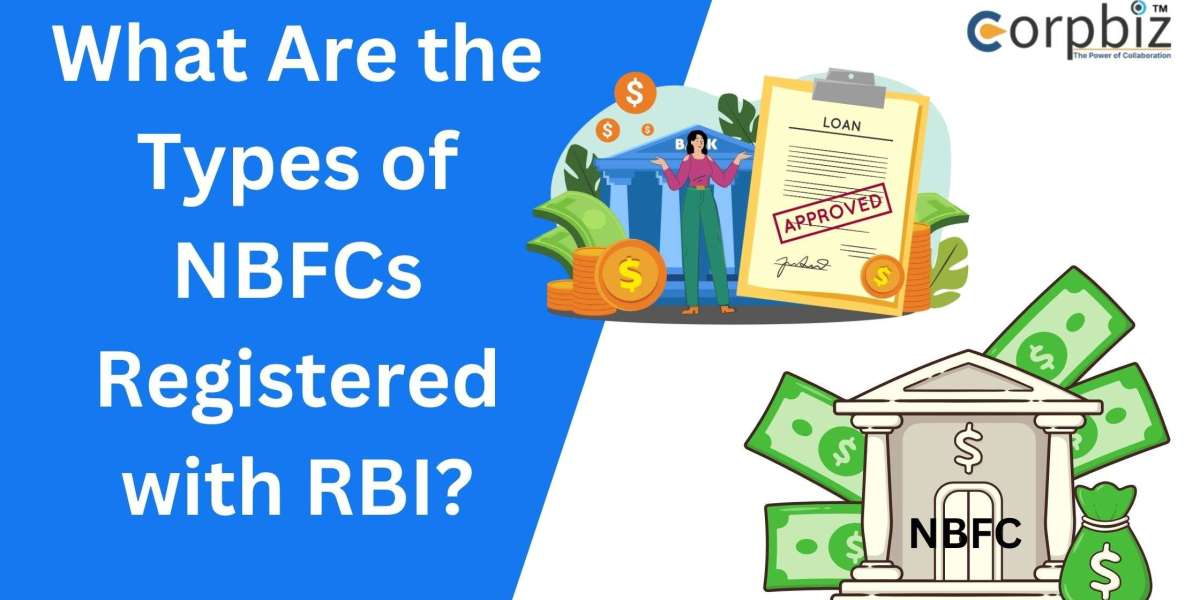When it comes to India’s financial system, Non-Banking Financial Companies (NBFCs) play a very important role. They act as a bridge between traditional banking and modern financial needs, helping individuals and businesses access loans, investments, and other services without going through the formal banking route.
The Reserve Bank of India (RBI) is the regulator for NBFCs in India. Any company that wants to operate as an NBFC must get registered with the RBI and follow its rules. But did you know there are different types of NBFCs? Each type serves a unique purpose.
In this blog, Corpbiz explains the main types of NBFCs registered with the RBI, along with how you can apply for an NBFC License online, whether it’s for a loan company, an account aggregator, P2P lending, or even a prepaid payment instrument (PPI) license.
What is an NBFC?
An NBFC is a company registered under the Companies Act, 2013 (or earlier versions) that provides financial services like lending, investments, asset financing, and more. However, NBFCs cannot accept demand deposits like banks.
NBFCs are important because they:
Offer loans to individuals and small businesses
Provide investment and credit facilities
Support rural and semi-urban development
Enable innovative financial products like P2P lending and account aggregation
Types of NBFCs Registered with RBI
The RBI has classified NBFCs into several categories based on their activities. Here’s a detailed look:
1. Asset Finance Company (AFC)
An AFC provides finance for purchasing physical assets such as machinery, equipment, or vehicles. These are common in transportation, construction, and manufacturing sectors.
2. Investment Company (IC)
These companies deal mainly in securities—buying, holding, and selling shares, bonds, and other market instruments. Their focus is on investing rather than lending.
3. Loan Company (LC)
Loan Companies provide loans and advances for various purposes, like personal loans, business loans, or working capital needs.
If you plan to start one, you can apply for NBFC online through the RBI’s application process. Corpbiz helps in preparing the required documents and ensuring compliance.
4. Infrastructure Finance Company (IFC)
These NBFCs focus on funding infrastructure projects like roads, bridges, power plants, and telecommunication facilities. They play a key role in India’s development.
5. Systemically Important Core Investment Company (CIC-ND-SI)
These companies hold shares and securities primarily for group companies. They invest at least 90% of their assets in group companies and are important in corporate group structures.
6. Infrastructure Debt Fund (IDF-NBFC)
An IDF-NBFC facilitates investment in infrastructure projects through bonds and other instruments. They help in long-term financing for infrastructure.
7. NBFC-Micro Finance Institution (NBFC-MFI)
MFIs give small loans to low-income individuals or groups, especially in rural areas, without demanding collateral. This helps in promoting financial inclusion.
8. NBFC-Factor
These NBFCs help businesses by buying their receivables (invoices) and providing upfront cash. This is also known as factoring.
9. Mortgage Guarantee Companies (MGC)
These NBFCs provide guarantees for housing loans, making it easier for borrowers to get approved by lenders.
10. NBFC-Account Aggregator (NBFC-AA)
An Account Aggregator collects and shares a customer’s financial data securely between financial institutions with the customer’s consent.
If you wish to start one, you can apply for an RBI account aggregator license online with the help of Corpbiz experts, ensuring you meet all RBI norms.
11. NBFC-P2P Lending Platform
Peer-to-Peer lending platforms connect borrowers directly with lenders through an online platform.
Entrepreneurs can apply for a P2P lending license online by meeting RBI’s registration requirements.
12. NBFCs Issuing Prepaid Payment Instruments (PPIs)
Some NBFCs offer digital wallets or prepaid cards for making payments. These require a PPI license from RBI. You can apply for a PPI license online, with guidance to meet all compliance norms.
How to Apply for NBFC Registration Online
To apply for NBFC online, here are the key steps:
Incorporate a Company under the Companies Act, 2013.
Ensure Minimum Net Owned Funds (NOF) of ₹2 crore (may vary for specific NBFC types).
Prepare Necessary Documents – business plan, directors’ profiles, audited financials, etc.
Apply to RBI Online through the COSMOS portal.
Submit Physical Copies of documents to the regional RBI office.
RBI Review & Approval after due diligence.
Corpbiz offers end-to-end assistance—from eligibility checks to documentation and RBI application filing.
Why Choose Corpbiz for NBFC Licensing?
At Corpbiz, we understand the complex RBI regulations and simplify them for entrepreneurs. Whether you want to:
Apply for NBFC online
Apply for RBI account aggregator license online
Apply for P2P lending license
Apply for PPI license
…our experts ensure your application is correct, compliant, and processed without unnecessary delays.
FAQs
Q1: Can I apply for NBFC registration online without visiting the RBI office?
Yes. You can submit your NBFC application online through RBI’s COSMOS portal, but physical documents must still be sent to the regional RBI office.
Q2: How much capital is required to start an NBFC?
The minimum Net Owned Fund requirement is ₹2 crore, though it may differ for specific NBFC categories.
Q3: What is the difference between NBFC and banks?
NBFCs offer financial services like loans and investments but cannot accept demand deposits like savings accounts.
Q4: How long does it take to get NBFC approval from RBI?
It usually takes 3–6 months, depending on the completeness of your application and RBI’s verification process.
Q5: Can an NBFC offer digital wallets without a PPI license?
No. Any NBFC wishing to issue prepaid cards or wallets must first apply for PPI license from RBI.
About the Author – Atul Shukla
Atul Shukla is a financial compliance expert at Corpbiz, specializing in NBFC licensing and RBI regulatory processes. With years of experience in guiding startups and large enterprises through complex financial laws, Atul is known for his practical approach, clear advice, and commitment to client success.














